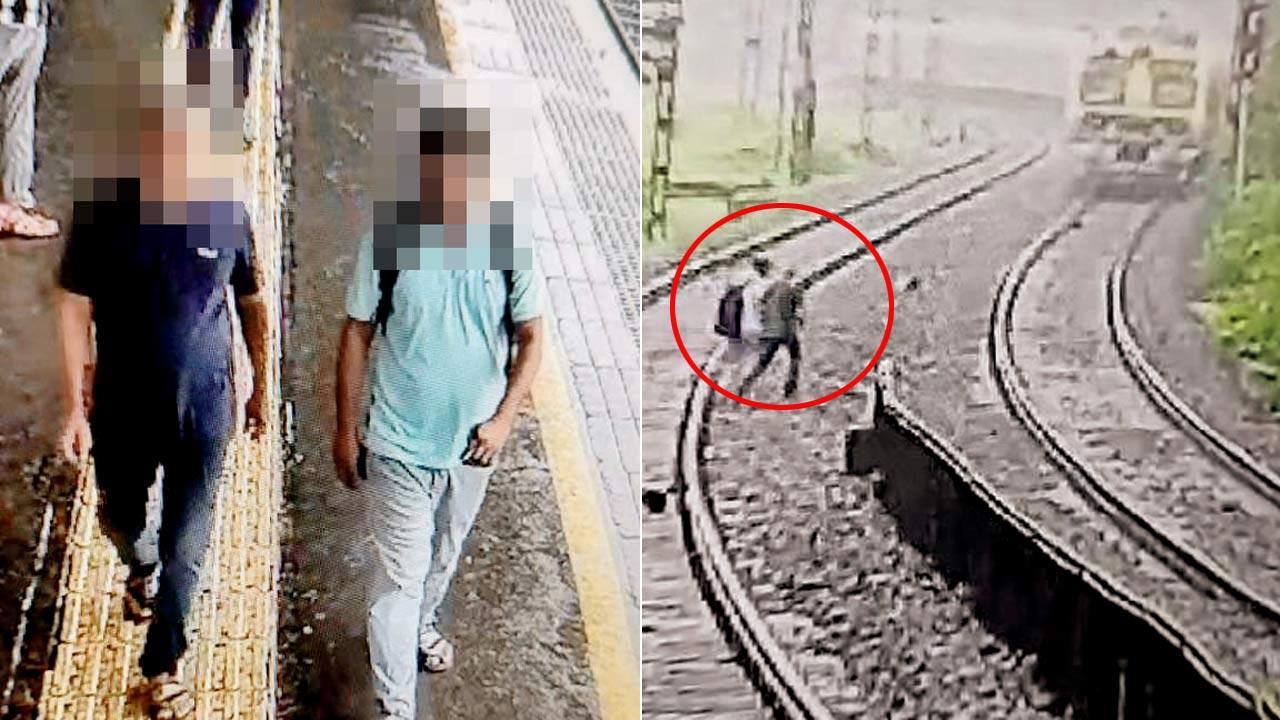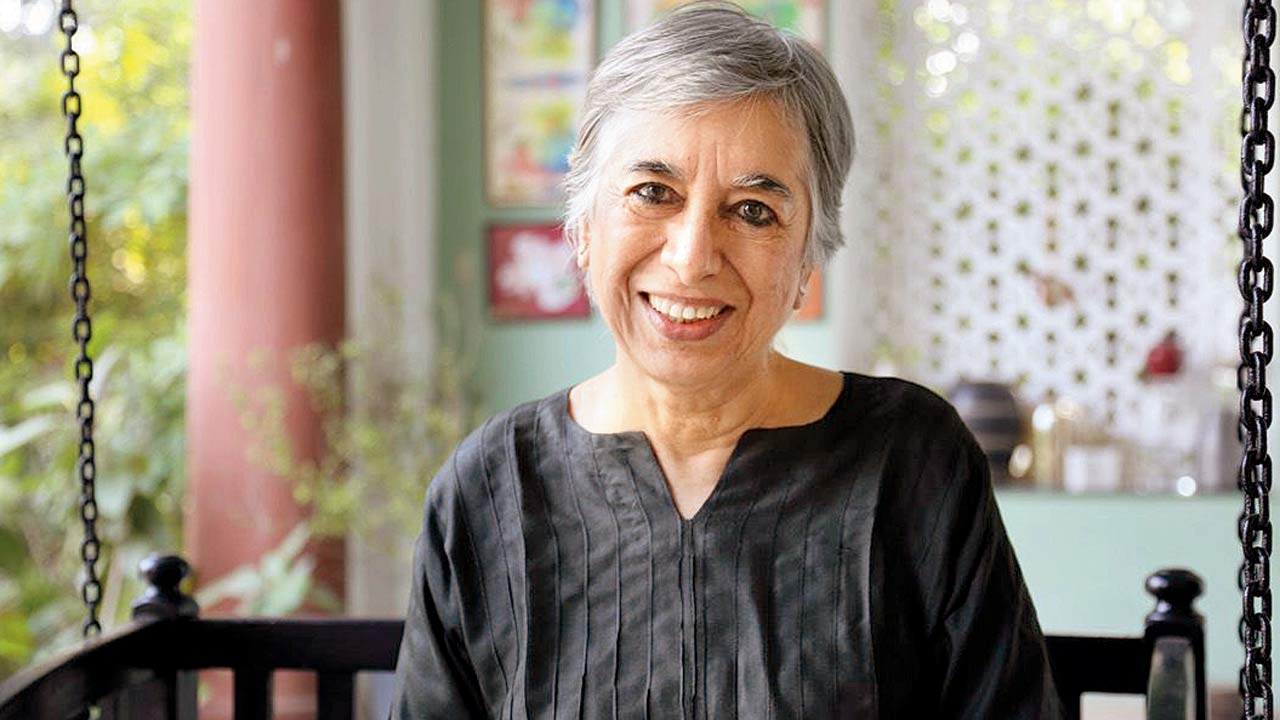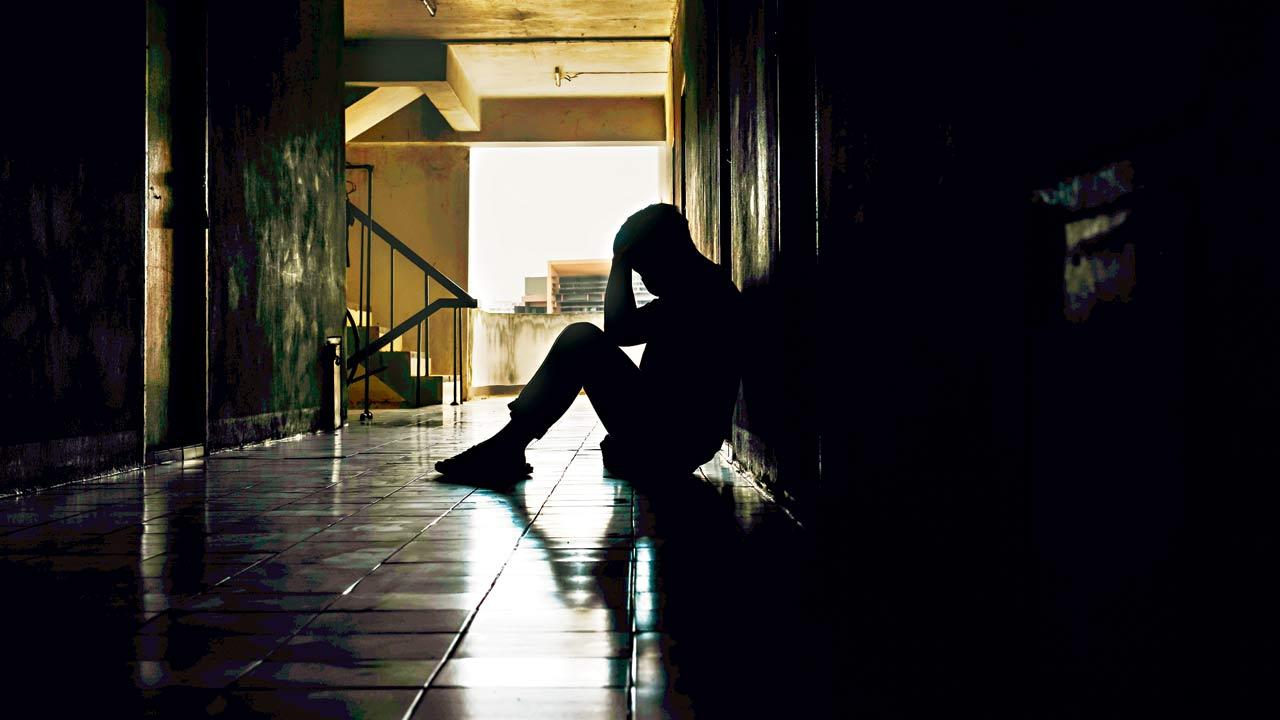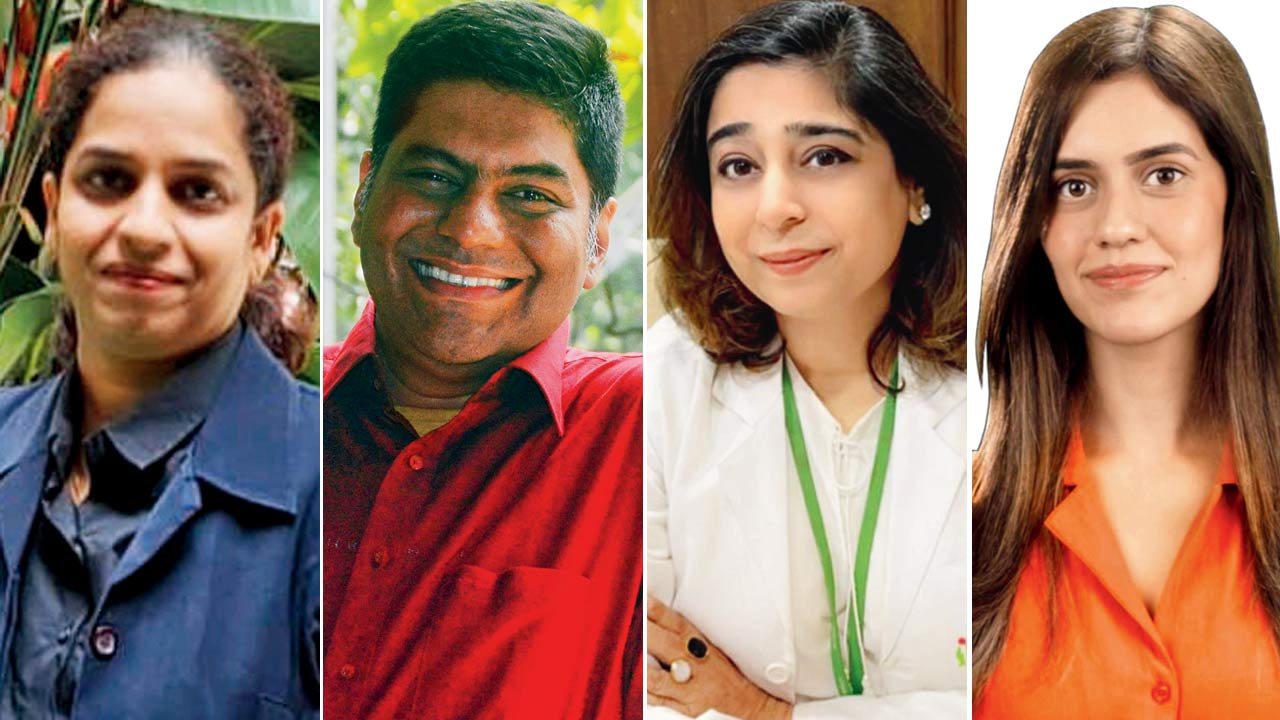The recent suicide pact between father and son in Bhayandar has raised questions about how familial closeness may not pay off for everyone

Harish (left) and Jay Mehta are seen at Bhayandar Station moments before they stepped on the tracks on Monday and died by suicide
At 11.28 am on Monday, Harish Mehta, 60, and Jay Mehta, 33, father and son, were seen walking on platform no. 6 at Bhayandar station. Harish walks in long, quick strides and seems agitated. Jay’s footsteps are deliberate, his shoulders tense. When the duo reaches the end of the platform, Harish is the first to try to get onto the tracks. Jay gives his father a hand and follows him frantically. As he catches up, Jay grabs Harish’s right arm as if to shake him out of the step he is about to take.
ADVERTISEMENT
There’s an oncoming train, and Jay pulls his father to the left to safety. Harish snaps, tugs his son to the right. They lie down on the ballast and cement sleepers drenched by Mumbai’s long-awaited monsoon, and position their necks on the track...
Police has been questioning the only surviving member of the Mehta family—Jay’s bride of just six months—at their Nalasopara home. Harish’s wife passed away in 2017. Harish worked in the stock market, and Jay was a sales professional. The police found nothing out of the ordinary in the Mehta home. Except the note in Harish’s pocket that says that no one should be blamed for their death, there are no clues to what led them to take this extreme step.
 Manju Kapur, author
Manju Kapur, author
“We didn’t find anything odd or suspicious in the Mehta home,” said Crime PI Ganpat Tumbada of Vasai railway police. “Jay’s wife told us the family was financially strong and none of the members had any loans. She said they lived happily together without any disagreements.”
It’s a case that shocked us, even though it shouldn’t.
Suicide contagion is a complex and rare phenomenon, and the joint Indian family can be the perfect breeding ground. The syndrome refers to an individual’s death by suicide triggering another person. This could happen because the second person identifies strongly with the challenges and mental state of the first person, and is driven to the same fatal choice.
“A suicide pact is a complex issue considering its sensitive nature,” says Deepti Puranik, Forensic psychologist and Assistant professor (psychology), NMIMS University. “Analysis of past cases of suicide pacts has indicated interconnectedness of multiple factors such as biological, environmental and social factors that push individuals to the extreme step.”
 Recent studies show that 50 to 90 per cent of individuals who die by suicide also suffer from mental illnesses
Recent studies show that 50 to 90 per cent of individuals who die by suicide also suffer from mental illnesses
The traditional family system, where one lives with parent/s or in a joint family, has long been defended by its proponents for the emotional support it offers. However, incidents such as these demonstrate that sometimes, that may not be enough. Increasing and unprecedented challenges faced by one member of the family could make depression contagious.
“The traditional Indian family support system is evolving,” says Bhavna Barmi, a senior clinical psychologist, relationship therapist and digital mental health provider. “Urbanisation, increased mobility, and changing societal norms have reduced close-knit support structures. While families still provide support, individualism and nuclear family setups have weakened the traditional safety net compared to a decade ago.”
In recent years, India’s lack of attention to the country’s mental health crisis has led it to top the wrong kind of charts. For example, back in 2016, the World Health Organisation (WHO) came out with a report in which India had the highest suicide rate in South Asia—16.5 suicides per 1,00,000 (one lakh) people. This was followed by Sri Lanka with 14.6 suicides, followed closely by Thailand (14.4) for every 1,00,000 as well. Our very own National Crime Records Bureau (NCRB) report released in April contained insight on this mental health crisis—the national suicide rate is at 12.4 people for every 1,00,000.
And this contagion can circulate quickly in a close-knit family. So it comes as no surprise kin are catching dispiritedness and melancholy from each other. “Depression can be contagious within a family due to shared environments and emotional contagion,” adds Barmi. “Previously, a family member might have pulled another out of depression. With changing family dynamics, such support systems may not be as strong, leading to a higher spread of depression among members. People are facing unprecedented challenges such as unemployment and financial stress, without adequate tools to deal with them.”
 Deepti Puranik, Forensic Psychologist; Saurabh; Bhavna Barmi and Achina Mayya
Deepti Puranik, Forensic Psychologist; Saurabh; Bhavna Barmi and Achina Mayya
Barmi adds that even cult leaders may influence families. “Faced with heightened stress and uncertainty, families turn to spiritual leaders for guidance and comfort in challenging times, sometimes over-relying on them for critical decisions,” she says. This brings to mind the grim Burari case where 11 members of a family in Delhi died by suicide as they felt that the deceased father was speaking to the family via his son, 45-year-old Lalit Chundawat.
In light of this, it is understandable that many individuals have left toxic home environments. A 35-year-old Mumbai mental health professional told us she was born to a father who didn’t want a daughter, and she felt that acutely growing up. “I was very attached to my mother, who died when I was 15,” she says. “I continued to live with my father for 12 more years because I thought he may love or respect me one day. But he had his own trauma and was a narcissist.”
She eventually left the family by marrying, but when her husband passed away, she didn’t go back to the family home. “I continue to live with my in-laws, even though my father messages me and calls me, because I know that living with him would hurt me,” she says. “Even if I am very happy, he sucks it out of me. My mental health is more important than this shallow notion of ‘he is my family’.”
The mindfulness coach has undergone therapy to heal her inner child. “I understand where his patterns come from, but I want to live my life, and he can live his,” she says firmly.
This may go against the whole fibre of the Indian family system and the dictum of ‘It’s all about loving your family’, but for many in the queer community, it’s choosing life. Saurabh, a Thane resident who counsels many in the community, says many queer folk leave home as it’s physically and mentally unsafe. “They have two choices, leave [and live safely and authentically], or stay on and follow what the family says,” he says. “Many are made to marry the gay away. Or marry and keep their sexual orientation on the down low.
As a result, most gay Indian men are married; that’s the truth. A toxic family doesn’t necessarily need to be a violent one, but it could be an environment where you cannot be yourself.”
In the Indian tradition, many children are seen as extensions of the parent, responsible for bringing honour and respect to the family. In her YouTube video titled ‘Why are Indian families controlling?’ Achina Mayya, co-founder AEOS and Aevy TV, cites a global HSBC report called The Value of Education that says 51 per cent of Indian parents would rather have career excellence for their children than mental well-being. “In our research, we found that most parents don’t see children as individuals in their own right. It’s a collectivist society, which is status driven,” she says. This is backed even by the almost 1,000 comments to her video—most young people said they feel heard and seen, and many agreed with Mayya’s observation that their interactions with parents feel like sales pitches.
“You have to negotiate as they also come from a certain conditioning,” she says. “If you ease their anxiety, they can be more conducive to your way of thinking.”
Author Manju Kapur, master of weaving tales about the Indian family with books such as Home and Difficult Daughters, says that there are no simple answers to complex events like the Mehta suicides. “Family situations are complex, and living in cities like Mumbai where space is less makes it worse,” she tells us. First, there is still a stigma against seeking therapy; secondly, this is not a problem you can deal with alone. “Modern stressors are complex,” says Barmi, “and traditional methods may not suffice. There is a need for contemporary strategies and professional support to tackle these effectively.”
“Of course, it runs in families, but it can also happen if you live alone,” Kapur says, “What the Mehtas did will cast a lasting shadow on those of their family, but they must have been under extreme stress. But this happens many times, across class and education. My MA thesis was on Hungarian-born author and journalist Arthur Koestler who died in a suicide pact with his wife, who was 20 years younger than him.
So, you die and take your partner with you. In India, it’s more a parent-child thing. When adults are unhappy, they promptly kill their children as well.”
Like love and hate are two sides of the same coin, so are support and toxicity. “You have inroads into someone’s mind, and you can either be constructive or destructive,” she says. “In India, children are meant to be reflections of their parents, and sometimes it just
goes too far...”
51 per cent
Parents focus on their children’s career over mental heath wellness
12.4
No. of suicides for every 1 lakh person
Inputs from Shirish Vaktania
 Subscribe today by clicking the link and stay updated with the latest news!" Click here!
Subscribe today by clicking the link and stay updated with the latest news!" Click here!







